




 |
   |
 |
|
Lucifer's Friend Lucille Furs Luna |
Garrett Lund Ulf Lundell Mats Lundgren & Mattias Olsson |
Lusk Lüüp George Lynch |
Lynch/Pilson Shelby Lynne Lynyrd Skynyrd |
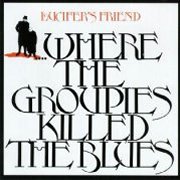 |
Where the Groupies Killed the Blues (1972, 41.24) ***½/T½HoboRose on the Vine Mother ...Where the Groupies Killed the Blues Prince of Darkness Summerdream/Delirium/No Reason or Rhyme Burning Ships |
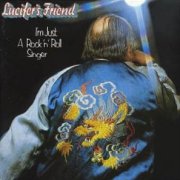 |
I'm Just a Rock & Roll Singer (1973, 44.00) ***/TTGroovin' StoneClosed Curtains Born on the Run Blind Freedom Rock'n'Roll Singer Lonely City Days Mary's Breakdown Song for Louie |
Current availability:
Mellotrons used:
Lucifer's Friend were one of many European outfits who recruited a British or American singer to sound more acceptable to English-speaking ears (see: fellow Germans Epitaph or Norway's Titanic), in this case, future Uriah Heep man John Lawton. The band actually don't sound too dissimilar to Heep, if less organ-driven, keyboard man Peter Hecht preferring the piano as his weapon of choice. On Where the Groupies Killed the Blues, they attempt that 'complex hard rock' thing that Heep and others were doing at the time, but don't quite have the chops, although they make brave attempts on Rose On The Vine and the title track, amongst others. As for Hecht's Mellotron use, I can only hear it on two tracks, with brass and strings on Mother and flutes on the title track. A string section is used in places, notably on Summerdream, although less so than on the preposterously overblown Banquet (***) of a few years later.
The following year's I'm Just a Rock & Roll Singer has a totally different style (a band trademark, it seems, a.k.a. an inability to stick to their guns), being more, er, rock'n'roll, the first six tracks being largely undistinguished boogie. Mary's Breakdown is more interesting, then suddenly we're presented with the album's closer, Song For Louie, a seven minute-plus full-on prog track, complete with experimental middle section. Er, huh? Not that I'm complaining, mind, but it doesn't fit in with the rest of the album in any way, shape or form, just accentuating the band's almost schizophrenic genre-hopping abilities. Hecht's on Mellotron again, with a flute solo on Mary’s Breakdown that he plays so fast, I almost thought it was real, before going completely mad on Song For Louie, playing dissonant flutes in the middle section, plus strings and brass all over the place, bumping the album up to an impressive and unexpected two Ts. Incidentally (and amusingly), Peter Hecht's other known Mellotron credit is on James Last's sole (to my knowledge...) Mellotron album, Non Stop Dancing 77. Stop laughing.
See: Uriah Heep
 |
Lucille Furs (2017, 41.22) ****/TT |
|
| The Fawn of Teal Deer Thoughts & Words Pink Noise Sunset Moon Baby Blaise Our Lady of Perpetual Frustration Carrie & Judy Does it Matter to You? |
Alabaster Crayon Please, Give Her This Letter In Saṃsāra Between Us Two/I Saw You |
|
 |
Another Land (2019, 38.17) ***½/TT |
|
| Another Land Leave it as You Found it First, Do No Harm Paint Euphrosyne Blue Sooner Than Later All Flowers Before Her Eventually, Madre de Exiliados |
Karaoke Trials The 34th Floor Transmitting From the Blind Guard Almond Bees No Word in English |
|
Current availability:
Mellotrons used:
Chicago's Lucille Furs are a blatantly Anglophilic current psychedelic act, whose eponymous 2017 debut consists of twelve perfect little psych/pop gems, most under three minutes, some under two, six-minute closer Between Us Two/I Saw You excepted. Influences? Mid-to-late '60s Hollies seem to be a band touchstone, along with The Turtles and the Lovin' Spoonful (admittedly both American bands), not to mention The Zombies. Top tracks include opener The Fawn Of Teal Deer, Pink Noise, the jaunty-yet-melancholy Carrie & Judy and Alabaster Crayon, but you'll search in vain for any lesser efforts. Oh, and don't think we didn't notice the major-to-minor shift from Astronomy Domine on Please, Give Her This Letter... Local psych hero Constantine Hastalis plays one (or both?) of his M400s, with flutes and cellos on Thoughts & Words, upfront, almost distorted flutes on Our Lady Of Perpetual Frustration, more relaxed flutes on Carrie & Judy and Please, Give Her This Letter and cellos on Between Us Two/I Saw You.
For some reason, 2019's Another Land doesn't grab me in quite the same way as Lucille Furs, although it's difficult to point the finger at any specific failings. Better material includes the sparse opening title track (with its Come Together bassline), the 12-string-and-Farfisa Do No Harm and The 34th Floor, but somehow, the band sound like they've lost a little of their joie de vivre in the intervening two years. Hastalis on Mellotron(s) again, if not that much, with cellos and brass on Leave It As You Found It, a melancholy flute line (and solo!) on Sooner Than Later, one of the woodwinds on the unusually-titled Eventually, (complete with comma) and brass on Byrds-esque closer No Word In English.
See: Constantine
The Luck of Eden Hall (US) see: |
 |
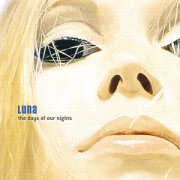 |
The Days of Our Nights (1999, 54.08) ***/TT |
|
| Dear Diary Hello, Little One The Old Fashioned Way Four Thousand Days Seven Steps to Satan Superfreaky Memories Math Wiz Words Without Wrinkles |
The Rustler U.S. Out of My Pants! The Slow Song Sweet Child o'Mine |
|
Current availability:
Mellotron used:
Luna are ex-Galaxie 500 guitarist Dean Wareham's band, who have apparently made a career out of not being noticed, which is a bit of a shame, as going by the albums I've heard, they're a reasonably appealing folk/indie sort of outfit with occasional Neil Young tendencies, which is no bad thing. The Days of Our Nights features songs of the quality of Dear Diary and Math Wiz, not to mention their laid-back cover of Sweet Child O'Mine, of all things.
Mellotron from bassist Justin Harwood and guest keys man Paul Kimble, although a faint choir swell and some background strings on Dear Diary are no match for the full-on (and very wobbly) string part on Hello, Little One, while although the backing vocals on The Old Fashioned Way sound real in places, with no female backing vox, we have to assume they're Mellotronic, too. Mellotron strings on Superfreaky Memories and The Rustler, although the cello on a couple of tracks is real, played by Jane Scarpantoni, who seems to have played with everyone, not least R.E.M. and Tiny Lights.
See: Samples etc. | Britta Phillips & Dean Wareham
 |
Almost Grown (1975, 38.07) ***/TThe Only TurnaroundSerene Silver Sails One More Reason Think of the Children Country Livin' Stop the World (It's All Over Now) Baby Blue |
Current availability:
Mellotron used:
Garrett Lund was an obscure mid-'70s American psych guitarist, hanging on to the previous decade' style for all he was worth, which turns out to be a fair bit, actually. 1975's Almost Grown (his only album?) is a good, if not outstanding late-period psych effort, better tracks including opener The Only Turnaround, Serene and Silver Sails, interesting touches including his Cipollina-esque guitar work and the trumpet solo on Think Of The Children.
Angie Gudino adds a nice Mellotron strings part to Serene, although the strings on Lund's cover of Dylan's (It's All Over Now) Baby Blue and the expanded CD's alternate take of Serene are real, indicating that the album must have had a reasonable budget. This is now easily available due to the efforts of German label World in Sound; while I can recommend it to fans of West Coast psych, it isn't really worth it for its Mellotron use.
 |
I Ett Vinterland (2000, 76.34) ***/TT |
|
| Det Nakna Trädet Vinterland Den Här Vägen Hennes Rygg Lycklig Man Atlanten Palatset En Ny Dag Randas |
Regn Sommarens Sista Servitris Ett Stenbord i Toscana Jag Saknar Dej Altaret i Maria Låt det Snöa Samma Land |
|
Current availability:
Mellotron used:
Ulf Lundell's been recording since the mid-'70s, 2000's highly successful I Ett Vinterland being something like his nineteenth studio release. It's an Americana-flavoured, Swedish-language singer-songwriter album, possibly at its best on the melancholy Palatset and closer Samma Land.
Martin Hederos (Soundtrack of Our Lives) plays most likely genuine Mellotron, with swelling strings on opener Det Nakna Trädet and Jag Saknar Dej, background strings (I think the cello's real) on Regn and strings and choir on Altaret I Maria, but nothing obvious on Hennes Rygg, despite a credit.
See: Samples etc.
 |
Insectual Music (2024, 5.06) ***½/TTTTUti Vår HageVisa Från Utanmyra I Denna Ljuva Sommartid |
Current availability:
Mellotron used:
Why am I completely unsurprised that Mattias 'Änglagård' Olsson should a) own a Mellotron on which a deeply eccentric lady (Gaby Stenberg, fact fans) had (wait for it) recorded thirty-five bees, naturally pitched across the keyboard, and b) has actually recorded with the fucking thing? I don't know if anyone knows the story behind Sternberg's recordings, not least, to whom did she send her tapes to have them copied onto ⅜" tape suitable for an M400? Or are they quarter-inch tapes going through the converter that Mellotronics made available in the '70s? Mattias, tell me! Anyway, what do you get when you go to the Bandcamp page? Three musical vignettes, adding up to a grand total of five minutes, all deeply minor-key, all somewhat Baroque, all first cousins to Epilog's brief opening piece Prolog. All played on Mellotron bees.
Alongside those bloody tuned bees, Lundgren adds another obvious sound to each track, viz a very Änglagård-esque flute part on Uti Vår Hage, chordal choirs on Visa Från Utanmyra and strings on I Denna Ljuva Sommartid. Since you can listen to these gratis, I suggest you do so before deciding whether or not to pay for downloads. This isn't any kind of criticism of these rather wonderful tracks, but... tuned bees aren't for everyone.
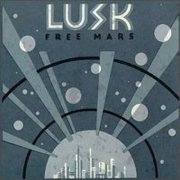 |
Free Mars (1997, 61.03) ***/T½ |
|
| Backworlds Savvy Kangaroos Gold Free Mars Doctor Mindray The Hotel Family Affair Black Sea Me |
Undergarden Kill the King My Good Fishwife/Blair's Spiders |
|
Current availability:
Mellotron/Chamberlin used:
Lusk were a '90s psych outfit, whose sole album, 1997's Free Mars, is a strangely unsatisfying blend of pseudo-'60s psych and then-current indie pop, full of moments that make the listener prick up their ears, followed by stretches of considerable averageness and over-stretched material. It certainly has its strong points: opener Backworlds vaguely reminds me of Knifeworld mainman Kavus Torabi's wonderful '90s outfit The Monsoon Bassoon, while Mindray's lysergic excursions make it one of the album's better tracks, but the album's sheer length (the timing above is minus the five-minute break between 'official' closer My Good Fishwife and the muckabout Blair's Spiders that actually closes the album) grinds all but the most patient listener down after forty minutes or so. I feel rather churlish in not giving this a higher rating, but despite its considerable attention to detail, it somehow failed to grab me in the way I was expecting.
Chris Pitman (now in Guns N'Roses, for his sins) plays Mellotron and Chamberlin, with that weird Chamby solo male voice and possible strings on Savvy Kangaroos, Mellotron strings on The Hotel Family Affair and flutes on Kill The King. As always with the Chamberlin, it's quite possible it's on other tracks, too, although with two cellists listed and all four members of the band proper credited with 'synthesizer', all potential parts could be just about anything, really. So; not as good as it should have been and not that much tape-replay. Pity. Probably worth picking up if you see it cheap, however, especially if you haven't yet had this month's psych fix.
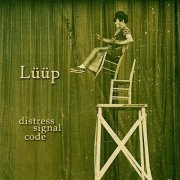 |
Distress Signal Code (2008, 57.52) ***½/TThrough Your WoodsFaith in You Water Sketches for Two Puppets From Here Distress Signal Code Our Waves Urban Legend Memories of the Future |
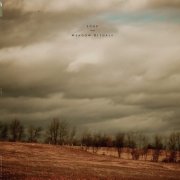 |
Meadow Rituals (2011, 53.31) ***/½Horse HeartTaurokathapsia Cream Sky Spiraling Roots Growth See You in Me Ritual of Apollo & Dionysus Northern Lights |
Current availability:
Mellotrons used:
Distress Signal Code is Stelios Romaliadis' Lüüp project's first album; a record by turns gentle, persuasive and attacking, despite its almost total lack of conventional 'rock' instrumentation. Romaliadis is a flautist, basing his 'chamber prog' compositions around the region where tonality becomes atonality, pulling in ex-Van der Graaf man David Jackson/Jaxon to help out on a few tracks. Believe me, this really isn't an album for anyone who doesn't listen to properly progressive music, by which I absolutely do not mean the wildly unadventurous AOR-cum-Pink Floyd stuff that seems to pass for 'prog' these days. It's rather difficult to pinpoint a 'best track', although the fourteen-minute Sketches For Two Puppets possibly best defines Romaliadis' approach. Nikos Fokas plays Mellotron on closer Memories Of The Future, with a string part drifting in and out of the mix. Did they source a real Mellotron in Greece? Possibly; this site lists a few '70s albums featuring one, so there could still be one or two in the country.
2011's Meadow Rituals seems to be more laid-back than its predecessor and simultaneously a little less engaging, although that could just be me. Best track? Once again, there's little point in trying to separate any one part of this record from any other; they're obviously designed to be listened to as a whole. Jackson guests again, although not to the point where VdGG obsessives might feel they have to own this. David Svedmyr plays his MkVI Mellotron on the album, if only just, with a brief flute part on opener Horse Heart that doesn't sound like the real one used elsewhere.
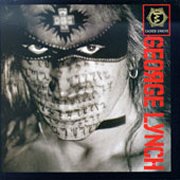 |
Sacred Groove (1993, 47.03) **½/T½ |
|
| Memory Jack Love Power From the Mama Head Flesh and Blood We Don't Own This World I Will Remember The Beast, Part I The Beast, Part II Not Necessary Evil |
Cry of the Brave Tierra del Fuego |
|
Current availability:
Mellotron used:
Another Jim Rigberg reviews, ladies'n'gents.
In the '80s, George Lynch was the guitarist for Dokken, a band that registered at least two gold and maybe one platinum album while never really being on the top of anyone's list of favorite bands. Part of the problem was the uneven product they produced. Singer Don Dokken - like many of his kindred mid-'80s, LA scene metalheads - just so desperately wanted to be all things to all people. I remember hearing a radio interview with him in 1985 or 1986 describing the band's third album, Under Lock and Key, stating something along the lines of "We have some power ballads, we have some Metallica-like songs, blah, blah, blah". And they did. For every raunchy early Van Halen-like It's Not Love or truly heavy-metal stuff such as Back For The Attack (which would please current power metal fans), there was a wussy attempt to channel Journey (the Jonathan Cain/Escape era Journey). The latter category of tunes certainly bought them hits - Alone Again and the lame lite-metal Dream Warriors from one of those Nightmare on Elm Street sequels, for example - but they could have avoided the 'hair band' label and built a solid audience that might still exist if they'd stuck solely to the former.
George Lynch was one of the best guitarists that the LA scene produced in the '80s. He had and has, a distinct sound - he loves the phrygian mode and diminished scales, and always had a killer tone - which lent a doomy and/or aggressive quality to even the goofiest Dokken songs. Not surprisingly, he and Don Dokken did not see eye to eye, leading to a rather spectacular implosion while the band was touring behind Back for the Attack in 1988 (or so). In the '90s, Lynch somehow managed to quell his feud with Dokken long enough to produce two albums before they started sniping at each other again and Don Dokken became a favorite target of web humorists (see, e.g. the hilarious Metal-Sludge.com).
In between the '80s Dokken and reformed Dokken, Lynch released a couple albums with his own band, Lynch Mob, and a 'solo' piece, Sacred Groove. While I like Lynch's playing and much of his song-writing (I suspect he was behind the music on the better Dokken songs), Sacred Groove was a bit of a disappointment. Memory Jack is about 1.39 of noise and though The Beast is listed as being in two parts - suggesting two songs or (admittedly a stretch) some kind of multi-movement prog excursion, it sounds like just one song to me. Realistically, therefore, there are 8, not 10, tracks. Love Power From The Mama Head and closer Tierra Del Fuego are instrumentals, the latter of which has a Latin-jazz groove and nice Spanish-style guitar solo from Daryl Gable. Neither of these is offensive, but neither is terribly exciting, either. The anthemic Cry Of The Brave and the bluesy-hard rock Not Necessary Evil, both featuring vocals from Glenn Hughes, are solid.
The highlight - from both the casual listener's and this website's perspective - is Flesh And Blood. Good riffing, nice solo and great moody Mellotron strings [and choirs - Ed.] played by Chris Fuhrman, who also engineered the album, underscoring the vocal melody in the chorus.
The low point is the aforementioned The Beast. It's not often that a singer's voice can destroy a song for me. Lynch got a fella who, unbelievably, is not (or was not in 1993) embarrassed to use the handle "Mandy Lion", to lay down pseudo-death metal cookie monster vocals on The Beast. These vocals don't sound threatening or scary. They sound like the cookie monster. That's why they call them cookie monster vocals. It's fucking horrible. Oh and the lyrics, which presumably were meant to be funny, aren't. The worst part of all this, is that, as was probably apparent from the beginning of the paragraph, the rest of The Beast (i.e. the music) is a good 'on the heavier' side rocker, with plenty of interesting sounds, including sitar. Indeed, it's apparent that "Mandy Lion" could probably sing well if he'd wanted to do so. The CD notes list Mellotron in both Parts 1 and 2 of The Beast. I'll be damned if I can hear it in Part 1. However, the Mellotron is used to nice effect in Part 2, but not nice enough to make this song listenable.
If you must own everything Lynch has ever put out, buy it. You'll get at least four good hard rock songs with much-better-than average hard rock guitar playing. If you have your own mixing equipment, the master tapes and the ability to sing at all, you can re-record The Beast for yourself and make that five good songs. No need to buy it for the Mellotron (I sure didn't, though the fact that there was some was obviously a pleasant surprise).
| Jim Rigberg |
See: Dokken
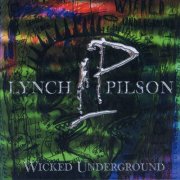 |
Wicked Underground (2003, 55.02) ****/T |
|
| Breath and a Scream Beast in a Box When You Bleed Vaccine Ever Higher Zero the End The Evil That You Are Awaken |
Cromaniac Goodbye Utopia Inner View Closer to None |
|
Current availability:
Mellotron used:
Jim Rigberg AGAIN!
Last year, ex-Dokken guitarist George Lynch and bassist Jeff Pilson joined forces for what, hopefully, will be the first of several excellent melodic-hard rock releases. The bulk of these songs are driven by Lynch's punchy tone and Pilson's thick, at times Beatle-y bass and smooth vocals. The stand-out tracks - When You Bleed, The Evil That You Are, Ever Higher, Closer To None - hinge on great hooks without sacrificing one iota of aggressiveness, thanks to Lynch's stellar riffing. Also notable is the instrumental - Cromaniac - a nice little piece of guitar violence that sounds like a thrash band channelling Joe Satriani.
Jeff Pilson is apparently the proud owner of an M400 which he puts to excellent use on Ever Higher, an Indian-music inflected cut. A nice string line surfaces during the intro and wafts in and out through a good portion of the balance of the song. The track builds quite nicely culminating in a proggy hard rock à la (the equally wonderful) King's X.
I can't recommend this for the Mellotron content (although it is used well). However, I highly recommend Wicked Underground for anyone interested in driving hard rock, fans of interesting guitar work and those who wondered what Dokken might have sounded like if they had been consistent.
| Jim Rigberg |
See: Dokken
 |
Love, Shelby (2001, 42.15) **/T½ |
|
| Trust Me Bend Jesus on a Greyhound Wall in Your Heart Ain't it the Truth I Can't Wait Tarpoleon Napoleon |
Killin' Kind All of a Sudden You Disappeared Mother |
|
Current availability:
Chamberlin used:
Shelby Lynne (elder sister to Allison Moorer) is a country singer who moved towards the mainstream pop market on her seventh album, 2001's Love, Shelby. It's about as bad as you'd expect, the one dissenter being the late-nite lounge jazz of Tarpoleon Napoleon which, while hardly classic (or even that good), at least provides some relief from the schlock that fills the rest of the record, including her closing version of John Lennon's Mother.
The ubiquitous Patrick Warren plays Chamberlin, with strings and flutes on Wall In Your Heart, strings on I Can't Wait and string swells on All Of A Sudden You Disappeared, with real strings on a couple of other tracks. This isn't as bad as many I've heard, which explains its relatively high two star rating, but I wouldn't take that as any kind of recommendation. Passable Chamby use.
See: Allison Moorer
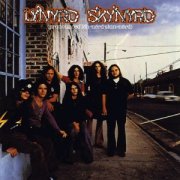 |
Pronounced Leh-nerd Skin-nerd (1973, 43.03) ****½/TTI Ain't the OneTuesday's Gone Gimme Three Steps Simple Man Things Goin' on Mississippi Kid Poison Whiskey Free Bird |
Current availability:
Mellotron used:
Lynyrd Skynyrd's first album (or at least, first released), Pronounced Leh-nerd Skin-nerd, must've come as a breath of fresh air back in '73; an unpretentious record that rocked, though not without a degree of subtlety, too. Like a heavier, less jamming version of the Allman Brothers, Skynyrd's secret weapon was killer songs; in my opinion, all but the rather irritating Things Goin' On still stand up well and the band play several numbers in their live set to this day.
Produced by Al Kooper, the album features Mellotron on two tracks, one better-known than the other; Kooper plays some excellent semi-orchestral arrangements on the country-ish ballad Tuesday's Gone under his long-time pseudonym "Roosevelt Gook". It seems he used this name on some of the Dylan albums he worked on, giving rise to rumours that 'Gook' was ol' Bob himself. The other Mellotron track on the album is, of course, the horrendously-overplayed Free Bird, presumably played by regular keyboard man Billy Powell. Unfortunately, this has to be one of the worst Mellotron performances on record; it's noticeably flat and badly-recorded to boot. Shame - however badly you never want to hear it again, the song is a classic and it's a real pity the Mellotron couldn't have been done a little better.
Of course, after the meteoric rise came the (literally) cataclysmic fall; the plane crash in '77 that killed vocalist Ronnie Van Zant and several other band and crew members finished the band for a decade. Since then, most other original members have died and they only manage to use the name at all by recruiting early drummer Rickey Medlocke, better known as guitarist/singer/mainman of slightly lesser Southern heroes Blackfoot, to make up the quorum of three 'original' members, satisfying various parties legally, if not exactly morally. Ronnie's brother Johnny has taken his place (leaving third brother Donnie with his own Southern/AOR crossover act 38 Special), but, of the original seven, a sad one now remains. Nonetheless, Skynyrd still rock like bastards and are always worth catching; I can't find it in me to castigate them for their slight legal chicanery, 'cos you'd be hard-pushed to find a better night out. No Mellotron, of course, but you'll go home happy. Incidentally and very sadly, Billy Powell died on January 28th 2009, at all of fifty-six. RIP.
Note: In 1978, after the band disintegrated, they released the best of their pre-Pronounced demos, poignantly, as Skynyrd's First...and Last (****½), which is at least as good as their first album proper. The expanded recent CD issue (Skynyrd's First: the Complete Muscle Shoals Album) explains the reason for the original version's lengthy track-by-track musicians list; the tapes were overdubbed before release, extra parts being added for various reasons. The gentle acoustic ballad White Dove, featuring 'Rickey' Medlocke on curiously-choirboyish vocals, credits Randy McCormick with Mellotron. Oh no it isn't... On subsequent listening, it's a generic string synth, so it's anyone's guess why it's miscredited like that. Who knows. Anyway, great album, but no Mellotron.
See: Samples etc. | Al Kooper | Blackfoot